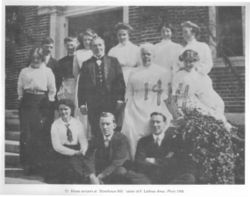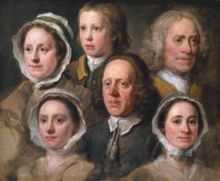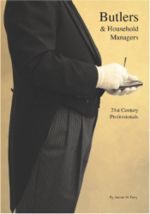Butler/Citable Version

The butler is a senior servant in a large household. In modern usage, the butler is in charge of food service, is the custodian of wine, liquor and silver and supervises other servants. The position has existed for centuries. Usually the butler is the most senior staff member, although this has evolved over time. Even today in the grandest homes or especially where the employer owns more than one residence, there is sometimes an Estate Manager over the butler.
In modern houses where the butler is the most senior worker, titles such as Majordomo, Butler Administrator, Staff Manager, and Head of Household Staff may be used.
In the great houses of the past, the household was generally divided into departments with the butler in charge of the dining room (including the wine cellar) and pantry, and sometimes the entire parlour floor, and a housekeeper who was in charge of the whole house and its appearance.[1] Housekeepers are occasionally portrayed in literature as being the most senior staff member and as even making recommendations for the hiring of the butler.[2]
Origin and development of the post of butler

The ancient equivalent of the post of butler was not typically filled by a person who performed their duties freely for compensation, as is the case today. More often than not, household servants were slaves and were kept relatively uneducated by their masters, although strict hereditary class lines meant the roles could also go to otherwise free persons. The story of Joseph in the biblical book of Genesis contains an early reference to those in the roles of butlers and household overseers. Joseph, sold as a slave in Egypt, rose as a slave to become the "overseer" (בית bayith) of his master Potiphar’s household.[3] Joseph later interpreted a dream of Pharaoh’s "chief butler" or "chief cup-bearer" ( שקה shaqah, "to give to drink").[4] The English word "butler" itself derives from the Middle English word buteler, from Old French bouteillier (“bottle bearer"), from buteille ("bottle"), and before that from Middle Latin butticula.[5] "Butticula", in turn, came down to English as "butt" from the Latin word buttis, meaning a large cask.[6] The modern word "butler" thus relates both to bottles and casks. From ancient through medieval times, alcoholic beverages were stored in earthenware vessels and wooden barrels rather than glass bottles, and this may have been a significant portion of an ancient household's assets. The role of the butler has apparently developed out of the functions of overseers or stewards of a household entrusted with the care and service of wine and other stored beverages.
Centuries later, the European butler emerged as a middle-ranking member of the servants of a great house. In charge of the buttery (which had nothing to do with butter), his duties related to the butts or casks where wine was kept.[7] Gradually, by the nineteenth century, the butler became the senior male member of a household's staff over not only the butts but the pantry, which supplied bread, butter, cheese and other basic provisions, and the ewery which contained napkins and basins for washing and shaving. In the very grandest households there was sometimes an Estate Steward or other senior steward who oversaw the butler and his duties.[8]
Responsibility and influence

Traditionally, the butler was hired by the master of the house but usually reported to the lady of the house. In the largest of households, the butler was head of a strict service hierarchy and held a position of power and respect. Such butlers engaged and directed all junior staff. Butlers were addressed by last name by their employers, their employers’ children and guests, but as "Mr. [Surname]" by fellow servants, retainers and tradespersons. These butlers were more managerial than “hands on”; they officiated in service rather than actually serving, for example, the butler was at the door to greet and announce the arrival of a formal guest, the door was actually opened by a footman, who would receive that guest's coat and hat. The butler helped his employer into his coat, which had been handed to the butler by a footman.[9] This notwithstanding, even the highest-ranking butler would “pitch in” when necessary (as during a staff shortage) to ensure that the household ran smoothly.
The butler engaged the footmen and assigned their duties. Footmen reported directly to the butler; the first footman (or head footman) was deputy or under-butler and filled in as butler during the butler's illness or absence. In a household without an official Head Housekeeper, female servants and kitchen staff were also directly under his management. Further, in a smaller household the butler usually acted as valet for his employer as well.
The modern butler
As household needs changed toward the 21st century, the butler began taking on more and more duties formerly reserved for junior household servants. Butlers today may carry out whatever household and personal duties their employers deem fitting, all in the goal of freeing up the employer to carry out their own personal and professional affairs. Steven M. Ferry states that the image of tray-wielding butlers who specialize in serving tables and decanting wine is an anachronism, and that employers may well be more interested in the butler capable of managing a full array of household affairs, from doing the traditional dinner service, to washing clothes and toilets, to acting as valet, to fixing plumbing or even computers. Except in truly grand houses where a butler may specialize, the modern butler is thus a kind of "Swiss-Army-knife", an all-purpose household affairs manager.[10]
Gender and butlering
For hundreds of years butlers were always male and this remains the usual case. There are, however, female butlers and they are sometimes preferred; an example would be in cultures where it is unacceptable to have males working intimately with females in a household. The International Guild of Professional Butlers states that there is a “definite demand” for females in the profession, as Middle and Far Eastern families often prefer female butlers, as do female celebrities.[11] On the other hand, the Ivor Spencer School cautions that females are not easily placed. By contrast, in a 2002 article, Pamela Spruce, principal of the Australian Butler School, stated that wealthy modern families tend not to want a man in their homes.[12]
Butler training
In times past, butlers earned their position by working their way up the service ladder. In the documentary The Authenticity of Gosford Park, former butler Arthur Inch describes starting as a hall boy.[13] Today, however, there are numerous butler schools; top graduates may earn USD 50,000 to start. The most highly skilled and experienced butlers are reputed to make USD 250,000 plus benefits.[14]
Some schools distinguish between the “British Butler” prototype and its American counterpart. Starkey International, for example, trains and promotes the latter, believing Americans do not have the “servant mentality” that is part of the British Butler tradition and stresses that their American-style butlers and valets are typically educated and certified.[15]
In addition to formal training, a few books have been published to assist butlers in their duties. Websites, as well as a news publication, The Modern Butler’s Journal, help butlers network and keep abreast of developments within their field.
Butlers in art

In a famous painting by the 17th century English artist William Hogarth, he depicted his household servants, each surrounding the butler. In depicting the group in a close-knit assemblage rather than in the performance of their routine household duties, Hogarth sought to profoundly humanize and dignify them. At the same time, he painted their facial expressions to convey the sincerity and deference expected of servant-class members.
Butlers in fiction
The real-life butler is discreet and unobtrusive. The butler of fiction, by contrast, is larger-than-life and has become a plot device in literature and a traditional role in the performing arts. Butlers provide often comic relief with wry comments, clues as to the perpetrators of various crimes and they are represented as at least as intelligent, or even more so, than their “betters”. Butlers in fiction almost invariably follow the “British Butler” model, with an appropriate-sounding surname. The Asian (or African-American, or Caribbean) houseboy is a variant, but even these major-domos are based on the British icon.
"The butler" is integral to the plot of countless potboilers and melodramas, whether or not the character has been given a name. Butlers figure so prominently in period pieces and whodunits that they can be considered stock characters in film and theatre where a catch phrase is "the butler did it!"
Famous butlers
- Paul Burrell, butler to the late Diana, Princess of Wales
- Hugh Edgar, butler, The Edwardian Country House, 2002 British historical recreation TV series – Edgar is an architect by profession, but was noted for immersing himself completely in his role.
- Paul Hogan, former Australian diplomat who portrays "the butler" in the US TV series Joe Millionaire – There has been some argument over whether the character in this series is actually a butler, but Hogan himself is now a professional butler.[16]
- Arthur Richard Inch, longtime real-life butler, Butler Technical Consultant for the film Gosford Park
- Ivor Spencer, Toastmaster and etiquette specialist, head of the Ivor Spencer International School for Butler Administrators/Personal Assistants and Estate Managers
Fictional butlers
The best known fictional manservant, and the prototype of the quintessential British butler, is himself not a butler at all. Reginald Jeeves, the iconic creation of author P. G. Wodehouse is a "gentleman's gentleman" or valet.
Alfred Pennyworth, from Batman, unusually known as “Alfred” rather than “Pennyworth”, “Hudson” of Upstairs, Downstairs fame and Crichton, from J.M. Barrie's The Admirable Crichton are probably the best-known butlers in English-language literature. Other notables include:
- Lynn Belvedere, from the novel Belvedere, the adapted feature film and its sequels, and the TV series Mr. Belvedere. Belvedere was originally a housekeeper; the gag was that because his first name was “Lynn”, the family was expecting a female. Belvedere is usually taken to be a butler in the television series.
- Benson, from the TV series Soap and Benson. Actor Robert Guillaume played Benson against type; his "running gag" was to pause when the doorbell rang, look at his employers quizzically and say, "You want me to get that?".
- Bunter, from the Lord Peter Wimsey series by Dorothy L. Sayers. Mervyn Bunter was originally batman, then valet to Lord Peter, but following Wimsey’s marriage appears to have transitioned seamlessly to de facto family butler.
- Cadbury, from Richie Rich
- Godfrey, from My Man Godfrey
- Geoffrey, from The Fresh Prince of Bel-Air
- Lurch, from The Addams Family
- Niles, from The Nanny
- Stevens, from The Remains of the Day
- For a more comprehensive listing of butlers and valets with notes, see Catalogue of butlers and valets.
References
- ↑ Emily Post’s Etiquette: A Guide to Modern Manners by Elizabeth L. Post. 14th Edition. 1984.
- ↑ 18th Century housekeepers made extra money by giving tours of the great house. See e.g. Pride and Prejudice by Jane Austen. It would appear that at this point in history the housekeeper still outranked the butler. An episode of the television series Upstairs, Downstairs portrays a powerful housekeeper who virtually guarantees a butler position to Angus Hudson, should he decide to accept it.
- ↑ Genesis 39.
- ↑ Genesis 40.
- ↑ Merriam-Webster New Collegiate Dictionary, 10th Edition.
- ↑ Ibid.
- ↑ The buttery was originally a storeroom for liquor, but the term later came to mean a general storeroom or pantry, probably because the original meaning was lost and in common parlance the word was assumed to relate to butter and other foodstuffs.
- ↑ The International Butler Academy, "Interesting Facts", http://www.butlerschool.com/interesting_facts.htm.
- ↑ Emily Post's Etiquette, op.cit. This version of the butler's status in a great house is widely accepted.
- ↑ Ferry, Steven M.. Butlers & Household Managers: 21st Century Professionals. BookSurge Publishing, 14. ISBN: 1591093066.
- ↑ www.butlersguild.com
- ↑ Move over, Jeeves, a new breed of butler is working her way up. James Woodford. October 5 2002.
- ↑ Documentary: The Authenticity of Gosford Park © 2002 USA Films
- ↑ The websites of butler schools and placements agencies such as The International Guild of Butlers, Starkey International and Town and Country Resources as well as eHow.com agree on a general salary range of $40,000 to $120,000 or more, depending on market, location and the individual’s skills and experience.
- ↑ Starkey does lay claim to understanding the British Butler tradition, however, their general approach seems to be that American domestic staff are better suited to American families.
- ↑ http://www.homestaffingnetwork.com/who_we_are.php?detail_id=3 A profile of Paul Hogan from Home Staffing Network International.
External links
- The International Butler Academy
- The International Guild of Professional Butlers
- Starkey International
- Videos of butlering
- The Modern Butler’s Journal
- The Butler Bureau
